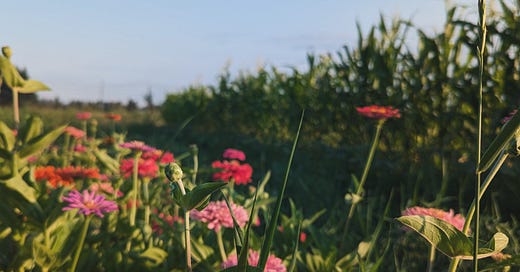#FieldNotes004: Permaculture & Regenerative Design Workshop
Exploring the syllabus for my upcoming offering starting October 19th
“Each one of us has, somewhere in his heart, the dream to make a living world.”
- Christopher Alexander, The Timeless Way of Building
Dear friends,
I'm excited to announce with you that I will be hosting a 5-part introduction to permaculture design workshop. I’ve been asked by some of you to share an outline of what will be covered during the workshop.
The workshop is based on Bill Mollison's Introduction to Permaculture as well as the recent work on regenerative systems. According to Bill Mollison, its co-originator, permaculture “is a philosophy of working with, rather than against nature; of protracted and thoughtful observation rather than protracted and thoughtless labor; and of looking at plants and animals in all their functions, rather than treating any area as a single product system.” In addition, permaculture is not just about gardens but rather about whole-system design. For that reason, it is about designing regenerative systems (ecological, social, economic, spiritual) that work with nature.
Workshop Overview
This five-part workshop will cover the fundamentals of permaculture design as outlined in Bill Mollison's Introduction to Permaculture. We will also look at cultivating a design mindset using Christopher Alexander’s The Timeless Way of Building and A Pattern Language. Other material will include Toby Hemenway’s Gaia Garden’s, Masonobu Fukuoka’s Natural Way of Farming, Ben Falk’s The Resilient Farm and Homestead, and David Fleming’s Lean Logic.
Online sessions will be held on Zoom, and recordings, slides, and resources will be made available.
Course Outline
Permaculture Principles and Broadscale Site Design (October 19)
Overview: Understanding the foundational ethics and principles that guide permaculture and regenerative design, and techniques for designing large-scale sites.
Topics Covered:
The spirituality, metaphysics, and tao of design.
The three core ethics of permaculture.
The twelve design principles.
Landscape reading and assessment.
Pattern Understanding and Structures (October 26)
Overview: Exploring natural patterns and their application in permaculture design, and integrating sustainable structures into your permaculture system.
Topics Covered:
Patterns in nature and how they inform design.
Using patterns to enhance ecological function.
Design and placement of structures.
Sector analysis and zones.
Water management and earthworks.
Energy efficiency and passive solar design.
Natural building materials and techniques.
The Home Garden, Orchards, Farm Forestry & Grain Crops, Animal Forage Systems & Aquaculture (November 2)
Overview: Designing productive and resilient home gardens, integrating perennial and annual crops, and systems for integrating animals and aquaculture.
Topics Covered:
Garden layout and planning.
Companion planting and polycultures.
Soil health and fertility management.
Integrating trees and grains.
Animal systems and aquaculture.
Practical Application and Site Visit (November 9 - in person)
Overview: Applying the principles learned so far through practical activities and a farm tour.
Activities:
Site design practicals.
Site Visit at Zahra Ecological Farm.
Prep work for next season.
Urban and Community Strategies (November 16)
Overview: Applying permaculture principles in urban environments and community settings.
Topics Covered:
Urban permaculture design.
Social permaculture and community resilience.
Nonviolent communication and regenerative governance.
Gift economics.
Registration
To register for the workshop or inquire about financial aid, please register below. The cost for the full workshop is $250.00 and all proceeds go to the Zahra Ecological Farm. Reduced pricing available for those who can only attend online. If you require financial aid, please let us know!
We look forward to embarking on this journey of regenerative design and land stewardship with you!





